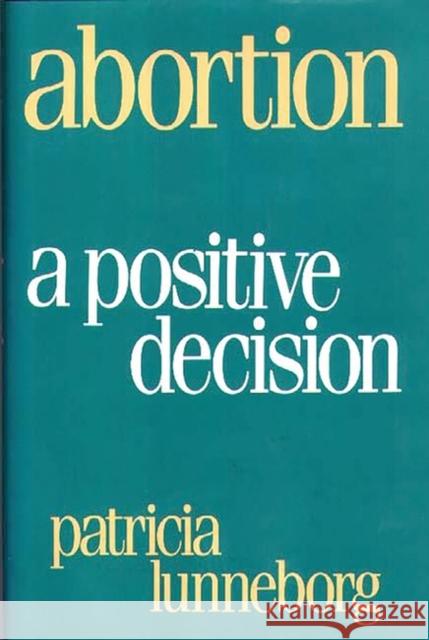Abortion: A Positive Decision » książka
Abortion: A Positive Decision
ISBN-13: 9780897892438 / Angielski / Twarda / 1992 / 232 str.
This book couldn't be more welcome, more timely. It takes an overlooked position, that abortion is not the lesser of two evils but a positive turning point in many women's lives. In addition to absorbing countless studies, Lunneborg talked with more than 100 women who have had abortions as well as with health care workers and counselors. She found that most women do not regret their decision. Many found it to be a key reassessment point in their lives: they looked at the directions their lives were heading, their relationships, their attitudes toward their bodies, their methods of birth control, and they made significant changes. Although definitely prochoice, Lunneborg's effort balances antichoice propaganda that paints women who have abortions as irresponsible and selfish, for the women Lunneborg presents are thoughtful and articulate....Lunneborg says she wrote the book to help women through the abortion decision-making process and to give health care workers and counselors more information when working with patients. But really, it ought to be required reading for anyone embroiled in an abortion debate. " Booklist"
The first book to focus on abortion decision making, this self-help counseling resource takes a decidedly positive stance. Challenging the view that abortion is the lesser of two evils, Patricia Lunneborg maintains that it is moral, life-enhancing, supportive to families, and beneficial to the lives of millions of women. Opposing public opinion that abortion is acceptable only in special cases, she contends that the best reason to have an abortion is simply the desire not to bear an unwanted child. Bashing the concept of the so-called Postabortion Stress Syndrome, she reports positive aftereffects such as feelings of relief, a new sense of control over one's life, and increased maturity. Lunneborg, a retired professor of psychology and women's studies, bases her views on over 100 interviews with women who have had abortions and with abortion providers, as well as research findings and her own experiences. What's more, in these pages she allows women who have had abortions to share what they learned about themselves, how their dreams for education and career were positively affected, how the children they chose to have are benefiting from their decision. Perhaps most important, many of the women tell of tremendous personal growth resulting from making a considered choice to have an abortion--for some, their first major decision.
Clearly stating her perspective at the outset, Lunneborg describes those who have abortions--women of all ages, ethnic backgrounds, and walks of life--and who provides the procedure. She offers strategies for making the decision, discusses teenage situations, explains how to use the experience as an opportunity for reassessment and growth, and stresses the value of talking about abortion--both for women who have had the procedure and for other people who are often unaware of the positive effects. A complete presentation, her book also sheds light on counseling before and after an abortion, contraception, family planning, the impact on education and careers, effects on relationships with others, and the work of the dedicated group of people who provide abortions. Throughout, Lunneborg's tone is conversational, warm, easy to read. Indispensable for any woman considering the procedure, Abortion: A Positive Decision also provides invaluable help to women who seek a reaffirming view of past abortion decisions, psychotherapists and counselors, and those who provide abortion services.











